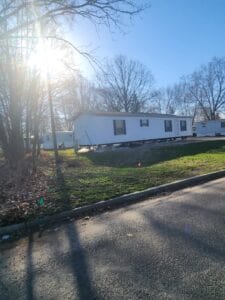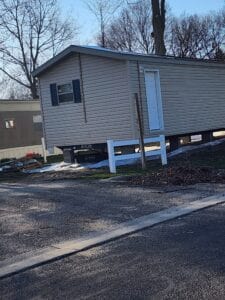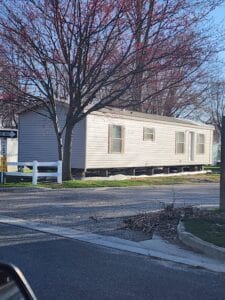Moving a Mobile Home From a Park
Complete guide to moving costs, challenges, and better alternatives. Get expert advice from buyers who've handled 1,000+ mobile home situations.
The Real Cost of Moving a Mobile Home
Many park residents don't realize the true financial impact until it's too late. Here's what you'll actually pay:
Licensed movers for single-wide homes. Double-wides can cost $15K-$25K+
State permits, route surveys, escort vehicles, and safety inspections
Foundation, utilities, septic, well, and site development costs
Electric hookup, water, sewer connections, and service deposits
Moving damage repairs, releveling, skirting, and final setup
Storage, insurance, delays, park fees, and unexpected expenses
The Moving Process Challenges
Even with unlimited budget, moving a mobile home involves significant challenges and delays:
Clear any lease obligations, pay back lot rent, and navigate potential park resistance. Some parks actively discourage moves.
Professional inspection to determine if your home can survive the move. Many older homes (pre-1990) are not worth moving.
Obtain moving permits, plan routes, schedule escorts, and coordinate with multiple agencies. Can take 45-90 days.
Empty the home completely, secure utilities disconnection, remove additions like decks and steps.
Weather-dependent transport that can be delayed by rain, snow, or high winds. Moving damage is common.
Foundation setup, utility connections, releveling, repairs from moving damage, and final inspections.

Common Park Situations That Lead to Moving Considerations
Our 30+ years of experience has shown these frequent complications and situations that prompt people to consider moving their mobile home from a park:
- Lot Rent Increases: Parks raising mobile home lot rent beyond what residents can afford
- Management Conflicts: Disputes with park management over rules, maintenance, or policies
- Eviction Threats: Understanding mobile home eviction processes and your rights
- Park Sale/Closure: New owners changing rules or closing the park entirely
- Quality of Life Issues: Deteriorating park conditions, safety concerns, or neighbor problems
- Family Changes: Job relocation, divorce, or inheritance situations requiring quick decisions
Important Reality: In most of these situations, the financial math of moving doesn't work out. That's why many residents in these circumstances find that selling to professional buyers provides a better solution than attempting to move.
Weather Delays and Other Complications
Beyond the financial challenges, practical complications make mobile home moves from parks particularly difficult:
- Weather Delays: Rain, snow, or high winds can delay moves for weeks
- Permit Issues: Route changes, bridge restrictions, or denied permits
- Structural Damage: Older homes often don't survive the moving process
- Utility Problems: Unexpected costs for electrical upgrades or septic issues
- Park Resistance: Some parks make the process as difficult as possible
- Hidden Costs: Storage fees, extended hotel stays, emergency repairs

Fast decisions, no waiting
No closing costs or commissions
We buy homes others won't move
No permits, movers, or hassles
Age and Condition Reality Check

Homes That Shouldn't Be Moved
Professional movers will tell you honestly - some homes just aren't worth moving:
- Pre-1980 Homes: Often fall apart during transport
- Homes with Significant Damage: Roof leaks, floor damage, or structural issues
- Homes Worth Less Than $15K: Moving costs exceed home value
- Homes in Poor Parks: May have hidden damage from deferred maintenance
- Homes with Additions: Decks, porches, and add-ons usually can't be moved
When Moving From a Park Makes Financial Sense
After 30+ years in the business, we've seen very few situations where moving a mobile home from a park makes financial sense. However, here are the rare scenarios where it might work:
- High-Value Newer Homes: 2010+ double-wides worth $40,000+ where moving costs are under 40% of home value
- Short Distance Moves: Moving within 25 miles to family land with existing utilities
- Permanent Land Ownership: Moving to land you own permanently, eliminating future lot rent
- Emergency Situations: Park closure with adequate time to plan and budget properly
Key Requirement: Your home should be worth at least $35,000-$50,000 to justify the total moving and setup costs of $20,000-$45,000.
Better Alternatives for Most Situations
For 75% of mobile home owners in parks, selling to professional buyers provides better financial outcomes than moving. Here's why:
💰 Financial Benefits
- Avoid $20K-$45K moving costs
- Get cash now vs. spending money
- No risk of moving damage
- Immediate equity access
⏱️ Time Benefits
- Close in 7-14 days
- No 3-6 month moving process
- Skip permit delays
- No weather dependencies
🛡️ Risk Benefits
- No structural damage risk
- No permit rejection risk
- No hidden cost surprises
- Guaranteed transaction
Frequently Asked Questions
The total cost typically ranges from $20,000 to $45,000 when everything is included. This covers professional moving ($8K-$15K), permits and inspections ($1K-$3K), site preparation ($5K-$10K), utility connections ($3K-$8K), repairs and setup ($2K-$5K), plus hidden costs like storage, delays, and unexpected expenses ($500-$2K). Many homeowners are shocked by the final total.
No, it's illegal to move a mobile home on public roads without proper licensing and permits. Only licensed, insured mobile home movers can transport homes on public roads. While you might be able to relocate a home on your private property, any road transport requires professional movers with proper permits, escort vehicles, and route planning.
Plan for 60-120 days minimum from start to finish. This includes 45-60 days for permits and planning, plus actual moving and setup time. Weather delays, permit issues, or inspection problems can extend this significantly. Many moves take 4-6 months to complete, during which you may need temporary housing.
Parks can prevent moves if you owe back lot rent or have signed a lease requiring the home to remain. They cannot stop you otherwise, but they can make the process difficult. Some parks place obstacles, require extensive notice, or charge substantial administrative fees. Always review your lease agreement and consider legal consultation if facing resistance.
While there's no official age limit, homes built before 1980 rarely survive moves intact. Professional movers often refuse pre-1976 homes due to construction standards. The structural integrity, frame condition, and overall wear determine moveability more than age alone. Most experts recommend against moving homes over 30-40 years old unless they're in exceptional condition.
Selling to cash buyers is often the most practical alternative. Professional mobile home buyers can close in 7-14 days, handle all paperwork, and often pay fair market value without the moving costs. Other alternatives include selling to another park resident, donating for tax benefits, or negotiating with your current park for better terms.
Some damage is almost inevitable during mobile home moves. Common issues include drywall cracks, window damage, plumbing disconnections, and electrical problems. Older homes face higher risk of significant structural damage. Professional movers carry insurance, but coverage may not include all repairs. Budget $2,000-$5,000 for post-move repairs and adjustments.
Contact experienced mobile home buyers who understand park situations and title issues. Look for buyers with 20+ years experience, proper licensing, and good references. They should offer free consultations, quick decisions (24-48 hours), and transparent pricing. You can get a no-obligation cash offer by calling/texting (989) 233-2568 or completing our online offer form for a response within 24 hours.
Available 7 days a week • Call or text for instant consultation
Related Mobile Home Resources
Moving Alternatives
Land Preparation
Serving Michigan, Indiana, Ohio and expanding nationwide • 30+ years experience • 1,000+ satisfied customers

